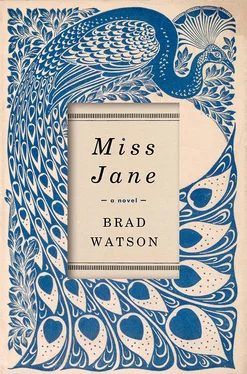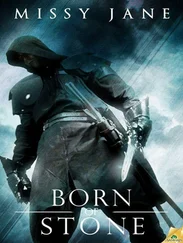“I don’t see a change,” she said then.
“Will she die?”
“Not young.”
Ida nodded again.
“She is strong. Even stronger than you,” Mrs. Eugenia said then. “She may even be relatively happy in life. Unlike you.”
Ida then laughed a curt laugh of her own.
“Nothing to be done about that, I suppose.”
“We are who we are,” Mrs. Eugenia said.
“Yes.” The bitterness now settling back deep in her heart, having lifted a bit in some silly, futile hope that a crazy old woman would tell her that her daughter would undergo a miracle and become whole. She reached into her purse.
“What can I give you, Mrs. Savell?”
“Call me Mama Jean,” Mrs. Eugenia said. “It’s my common name.”
“All right.”
“If you have a dollar, it would help me with my groceries, and some fertilizer.”
Then again, it was all strange enough to be true. She found a silver dollar in her change purse and laid it carefully into the surprisingly smooth palm held out to her, and the long, thick fingers closed over the coin, opened again with Mrs. Eugenia looking at it as if she’d made it appear there by sleight of hand.
“Mama Jean,” Ida said, “I wonder. There’s a story that the ghosts of old soldiers would visit you and your husband, and the ghosts of ladies in the town, and would dance here in your parlor.”
Mama Jean looked blankly at her as she posed the question, then blinked and looked at a spot in the other room.
“Not since I sold the piano to pay for my husband’s funeral,” she said.
Ida showed herself out. She could see a storm coming over Sand Mountain to the south. Sky full of hazy blue light above, a strange deep blue almost black in the hills, and silent, as if it meant business. They would have to hurry to get home before it hit. The creek would be up in such a rain, if it didn’t dump all of itself into the valley where the people of this town sat awaiting it, powerless like all of God’s children on this earth, who needed such reminding now and then that they were mortal. Ida Chisolm didn’t.
Elijah came over with a Brownie camera one day and took some pictures of her on their walk. He mailed the film to town to have them developed and printed. One, his favorite, was of Jane looking over her shoulder at him in a flirtatious way, and she made him give her the print of that one, she thought it was so funny. “But it’s my favorite one,” he said. “Well, you just get yourself another one made up,” she said.
Her mother and father, demure in their greetings but not impolite, watched them from the front porch as they would pause and turn to one another, as the Key boy would sometimes take her hand when he spoke to her.
After having seen the photograph and thinking about it as he sat before the fireplace late into an evening, her father had an idea to send Jane into town to live with her sister Grace, who was now proprietor of the dry-cleaning operation she’d started out with as a seamstress. Chisolm worried that living in town might afford Jane less freedom to get out and about — at least here she had roam of the property without socializing if it wasn’t convenient — but thought it might be a good thing to separate her from the Key boy, for the good of them both.
“Better to have her upset with me than have her heart broken by that boy one day,” he said to himself.
“Of course,” his wife said, surprising him. He hadn’t known she was in the room. He looked at her, a bit irritated by her sneakiness and her sarcastic tone.
Things were getting no better moneywise, either. He would worry less, maybe, if she wasn’t around, if she was in town learning how to live off the farm, moving toward learning how to be on her own in the world. Once he’d really thought about it, he couldn’t imagine she’d want to live on this farm by herself when he and the wife were dead and gone.
And to himself he admitted he was drinking more. Craving it more. Slipping off to his makings shed more often. But after a few drinks he would forget or not care about discretion and bring the jug or jar back up to the house. He worried about her seeing that.
His wife suggested that Jane could take in some sewing, maybe from some of Grace’s customers, to help out with expenses. She might build up a little business of her own that way.
They presented Jane with the idea the next afternoon before supper. She looked at them, sitting there at the kitchen table beside which she stood, listening. Her face had taken on the kind of look she’d put on as a child, when something upset her.
“I’d rather just stay here,” she said. “I can earn my keep.”
“Well,” her mother said, deliberately not looking at her. “We think it’s the best thing for now.”
Jane went into her room and sat on the bed, hearing her father go out again and her mother get to work on the meal. In a while, she got up and went back into the kitchen to help. Her mother stopped to look at her, then went back to what she’d been doing.
“You could take in some sewing work, like I said, just to help Grace out a little,” she said. “She practically raised you, anyway.”
“Yes, ma’am,” Jane said. “But don’t make me leave right now. Please. Not just yet.”
Her mother looked at her long enough for Jane to feel the room begin to close in on them, the outside world to disappear from her senses. “And why do you want to stay here, with just us? Why do you want that so much just now?”
“I’m not like Grace. I’ve never wanted to get away, restless. Let me stay at least through the spring. For the dances, then. I had such a good time.”
“Maybe you are restless,” her mother said. And they stared at one another until her mother stood up to leave the room.
“If you would watch those peas on the stove,” she said as she left, “I’d appreciate it. Don’t let them boil over. I need to get out of this house for a bit.”
“All right.” Although she said it softly and her mother didn’t appear to be listening, reaching for her tin of snuff up on the mantel before going out onto the porch to sit by herself for a while.
THERE WERE LIGHT breezes passing through the hay stalks, cotton bolls beginning to bloom, the corn leafed out deep green. Jane walked with the doctor down into the woods and around the fishing pond and he talked about his love for fried fish and potatoes and patted his growing belly. Occasionally he pulled his briar pipe from his vest pocket and loaded it with tobacco and stopped to smoke leisurely while she waited. He was getting on in years, not really old but seemed so to Jane, and he stopped often to catch his breath and sigh out about how he knew he wasn’t really getting old, but he sure wasn’t young anymore. When they came out of the woods and walked down to the pasture below the house, he paused in his gait, knocked ashes from his pipe, and said, “Well, I have put off showing you this, or giving you the information that I promised I would, but from what your parents say, you and the Key boy seem to be courting in earnest, and so I thought I should not put it off any longer.”
She listened, her ears burning with what she half knew and feared he was going to say.
“You showed me,” she said.
“I showed you the simple stuff,” he said. “And gave you a general explanation. What I have to show you now is more detailed and specific.”
“Okay.”
“I know you’re both still very young and I doubt seriously either of you has thought ahead to anything more serious between yourselves. But still.”
He pulled from the side pocket of his jacket a printed pamphlet, with illustrations, and gave it to her.
Читать дальше












